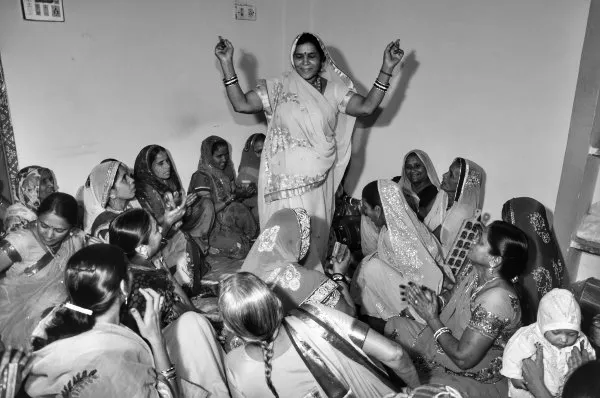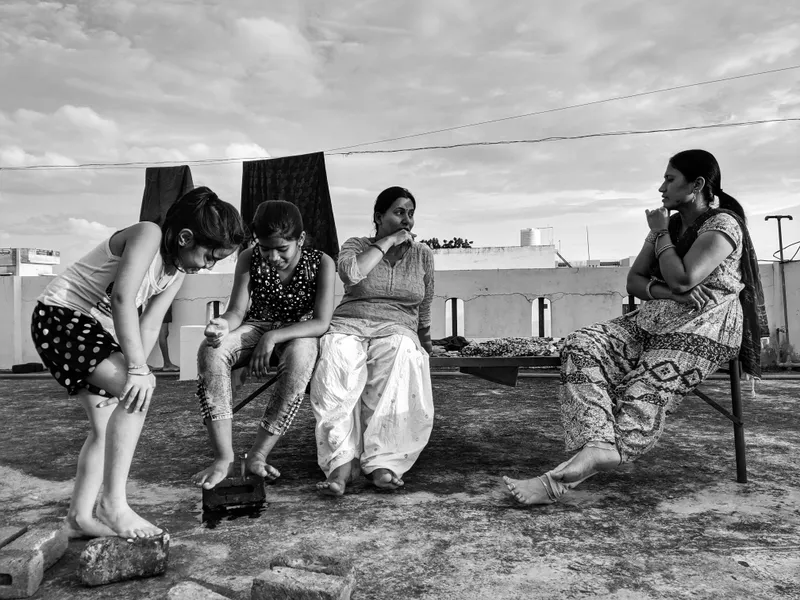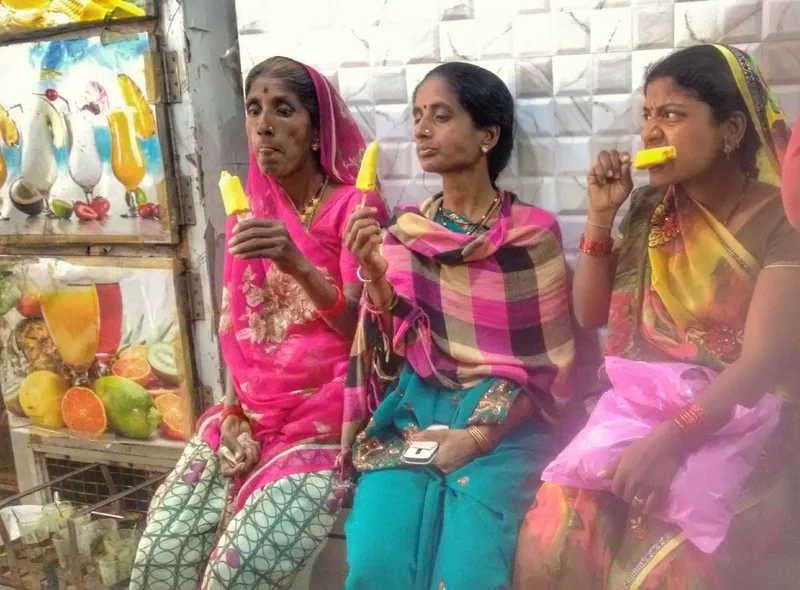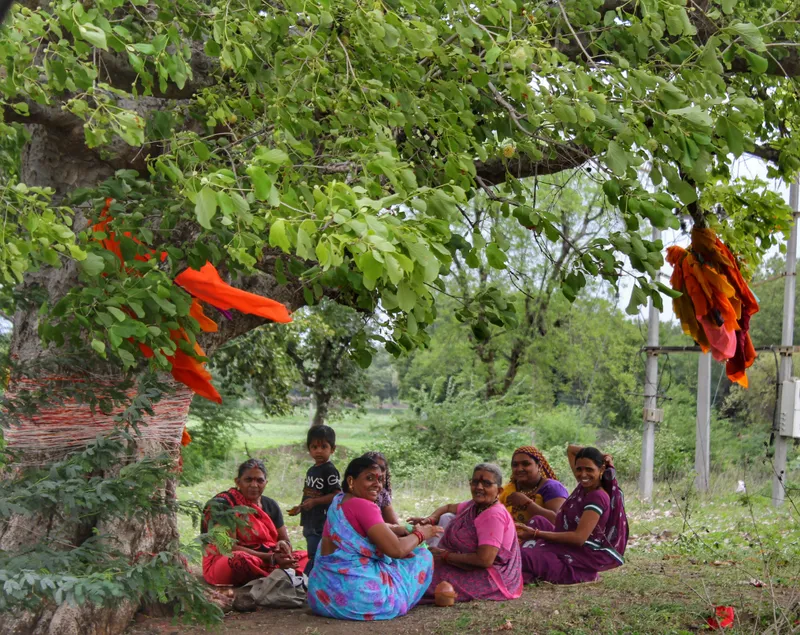Embracing women’s leisure as a tool for feminist liberation
“Basanti: Women at Leisure” an Instagram page is a repository of photos and videos of women enjoying their free time. It intends to celebrate the fleeting unguarded moments of women’s leisure.
The water glistens with warm sunlight while a group of women–unguarded and undisturbed–immerse in a brief moment of frolic in the sea.
Relishing the moment with carefree abandon, they fill the air with laughter and excited voices. While some are playfully splashing each other, others are rolling in water with joy. Each one exudes a sense of freedom.
Playing in the water, bursting into fits of unceasing laughter, lying on the ground, playing cards or dancing around with friends–common acts of leisure and fun–are a rare treasure for women.
Glimpses of these rare events are present on the Instagram page “Basanti: Women at Leisure”. The page, a repository of photos and videos of women enjoying their free time, intends to celebrate the fleeting unguarded moments of women’s leisure.
Celebrating women’s leisure and its power as a tool for feminist liberation, Surabhi Yadav, founder of Sajhe Sapne (NGO), started the project in 2019.
“Project Basanti is a small way to provide the world, a language to talk about, reflect and reevaluate women’s leisure which isn’t much recognised,” Yadav tells HerStory.

(Credit: Surabhi Yadav)
The realisation
Yadav, who lost her mother at 23, remembers her being as the life of the party. During a Holi celebration, Yadav’s mother performed a series of “loud roles”, including that of a drunkard.
However, as a teenager Yadav never liked her mother performing such acts. And, it was only after her passing that Yadav realised that the mother she knew was limited to her role and not beyond. She felt the urge to know who she was beyond the spectrum of responsibilities.

Surabhi Yadav
“In my 20s I was shaping my identity in the world and in that process, I also started thinking about my mother’s individual identity,” Yadav says adding, “Back in the day I felt like those acts she performed were a shameless hilarity, however, those were just some unfiltered and unguarded moments of my mother’s leisure time.”
After her mother’s death, Yadav decided to know more about who her mother was as a person. In that quest, she met many of her friends, some of whom described her as a “mazakiya” (a fun and goofy person) which Yadav had never imagined her mother to be.
“Those were not the adjectives I could associate with my mother. I always thought that my father was the funny one. All I was left with was the question that where this fun person was hiding within the house walls,” Yadav says.
After her mother, Yadav began to closely look at the life of her sister who is a teacher and a mother of two kids. Along the way, she felt that ownership of time and how one uses it was very different for her and her sister.
“I was free from any responsibilities and I could do anything and be anywhere. However, my sister who has many responsibilities, exercised her leisure differently and rarely,” she says.
What started as a way to know more about her mother soon became an extensive inquiry into what women do when they are not working. This led to the start of the Instagram page Basanti: Women at Leisure, named after Yadav’s mother.
“Basanti also means spring which allows flourishing and I feel leisure exactly does that,” she adds.
Yadav takes pictures and videos of the most unguarded moments of women’s lives and shares them on the Instagram page with their consent. Yadav has built a community of 25,000 people on Instagram. Now, she also posts crowdsourced images on the handle.
Leisure as a tool for feminist liberation

(Credit: Surabhi Yadav)
Every weekend, Radha Verma and her friends would pile into a car, windows down, and let the rhythm of music pulsate through the speakers. Their laughter would mingle with the beat of the music while they shared their deepest fantasies, envisioning lives of abundant riches and unconditional freedom.
This fun without any restrictions, embodied the essence of leisure for Radha, now a 50 -year-old mother of two. Looking back at her young days, she feels that those fleeting moments of unfiltered pleasure are now lost in time.
For many women like Radha, as responsibilities grow, leisure takes a back seat–by choice or by force. Yadav too thinks that leisure has become a game of permissions that involves factors like class, and gender.
Elucidating, she says that in Indian society men are entitled to watch television, laze around, loiter or do purposeless visits to the market. However the same does not hold ground for women.
“It becomes a question of who is allowed leisure,” Yadav says.
She believes that under the pile of responsibilities that society expects women to fulfil, their true self is lost.
Yadav believes that in the argument about inequality—money, property, power, and rights—is discussed but time as a resource and its ownership is hardly taken into consideration.
“Being idle and using your time to do anything you want to do is a choice men are entitled to however women need to fight for and justify their idleness,” Yadav says. She believes this becomes even worse for homemakers.

(Credit: Surabhi Yadav)
“Labour is seen as a quantifiable term that often misses out on the labour of caregiving and managing homes. This type of work largely remains unacknowledged and underappreciated,” she says.
Many women often struggle with the concept of fully enjoying their free time and embracing it without any feelings of guilt or self-doubt, which can sometimes lead to a sense of diminished self-worth.
Yadav believes that since women’s leisure is less talked about topic, the chance to truly get to know the women in our lives is lost.
She defines leisure as “any stretch of time in which one's guards are down or when one is not performing any social, political and economic role". She believes that leisure flourishes our inner selves and lets us be.
Calling it a portal to know ourselves, Yadav elaborates that, “Not letting people be their true selves and governing who they should become is an oppressive structure. Leisure can be an answer to such dominant structures as it provides us with a state of just existing in our truest form–a right rendered to us by birth.”

(Credit: Surabhi Yadav)
She recalls another instance where her page featured photographs of a transwoman who spent her leisure time dressing up as a woman. For that person assigned male at birth, leisure was a pathway to unlock her true identity.
Yadav believes that the benchmark of today’s feminism is quite low. “We are mostly in survival mode as we fight for land and money to ensure our physical and financial safety,” she says.
She urges that the standards of feminism need to be expanded to the level where women too enjoy undisturbed and unguarded time.
“We need a little less judgement and much more self-actualisation to make this world a place where women can lie in bed for no reason at all,” Yadav signs off.
Edited by Affirunisa Kankudti







